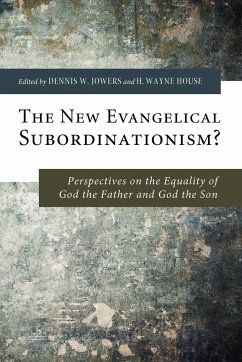
The New Evangelical Subordinationism?
Versandkostenfrei!
Versandfertig in 1-2 Wochen
45,99 €
inkl. MwSt.

PAYBACK Punkte
23 °P sammeln!
Whether and in what sense the Son of God might eternally submit to his Father's will is a question that has ignited a firestorm of controversy in today's evangelical academy. On one side stand those who regard the affirmation of any inequality whatsoever in the Godhead as a revival of ancient subordinationism. On the other stand persons who consider the Son functionally subordinate to the Father even within the immanent Trinity, without respect to the Incarnation, and regard their belief as integral to historic orthodoxy. Many evangelicals, moreover, view the issue of subordination within the ...
Whether and in what sense the Son of God might eternally submit to his Father's will is a question that has ignited a firestorm of controversy in today's evangelical academy. On one side stand those who regard the affirmation of any inequality whatsoever in the Godhead as a revival of ancient subordinationism. On the other stand persons who consider the Son functionally subordinate to the Father even within the immanent Trinity, without respect to the Incarnation, and regard their belief as integral to historic orthodoxy. Many evangelicals, moreover, view the issue of subordination within the Trinity as pivotal to contemporary disputes about the role of women in church, home, and state. If the relations of the divine persons constitute a paradigm for human life, persons on all sides of the gender question argue, human relations ought to reflect either the divine persons' exceptionless equality or their orderly differentiation of roles. At the same time, others consider the issues of equality in the Trinity and gender relations irrelevant to each other and accuse both complementarians and evangelical feminists of degrading the doctrine of the Trinity into a partisan weapon. The New Evangelical Subordinationism? gathers commentary on evangelical debates about equality and subordination in the Trinity from representatives of the gamut of perspectives just mentioned. Here, evangelical theologians, biblical scholars, and church historians of widely differing theological orientations address themselves to the panoply of questions raised by these debates. This volume, unprecedented in the breadth and depth of its coverage of the controversy over subordination in the Trinity, should become a standard source for teaching and research on its subject.












